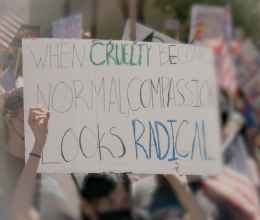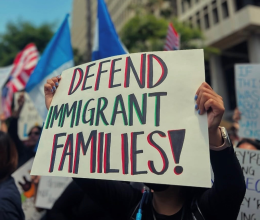For more than one year, the government has refused to turn over information about a key representation it made to the Supreme Court regarding how long it detains certain immigrants during deportation proceedings. It has offered no explanation for its silence.
After repeatedly asking for this information under the Freedom of Information Act (FOIA) – which provides public access to government records – the ACLU of Southern California has sued to compel disclosure. FOIA gives courts authority to require the government to make certain information public.
The government’s behavior stands in stark contrast to the purpose of FOIA: transparency. While the government is legally required to respond to FOIA requests within 20 days – or within 30 days, if there is an extension – it has flouted its own deadlines, and has yet to produce a single document in response to ACLU/SC’s request.
This isn’t merely a theoretical issue. The information ACLU/SC is requesting has changed countless lives.
In 2003, the U.S. Supreme Court heavily relied on information from the Solicitor General in Demore v. Kim, a decision upholding a punitive federal immigration law that requires detention – without bail – of immigrants who are here lawfully, but face deportation for certain criminal convictions, including for fairly minor offenses. The decision undermined that most basic of due process guarantees: the right to an individualized bail hearing before the government can imprison someone.
In upholding this draconian system, the Supreme Court repeatedly relied on statistics provided by the Solicitor General that indicated that immigration detention is generally “brief.” However, the Solicitor General introduced those statistics for the first time at the Supreme Court, and it has never disclosed the factual basis for its representations.
Following the Court’s decision, the government has forcibly detained numerous immigrants, without the possibility of bail, as they fight their deportation proceedings, even if their detentions last months or years, and even if they do not present any danger to the community. For example, Byron Merida was locked up for over three years for no good reason. For the past five years, through the Rodriguez v. Robbins class action, the ACLU/SC has been fighting to ensure that people like Byron have the opportunity to seek release after they have been detained beyond the “brief” periods the Supreme Court upheld in Demore.
The public deserves to see the data behind the government’s assertions to the Supreme Court. ACLU/SC asked for this data in March of last year. Although the government acknowledged receiving the request, it hasn’t turned over any information – even after ACLU/SC appealed. Latham & Watkins is representing ACLU/SC in the lawsuit.
Michael Kaufman is Staff Attorney at ACLU of Southern California
Report ICE Activity
Contact your local rapid response network.

